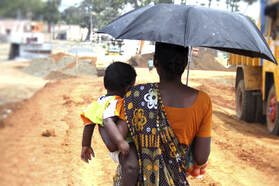
The effects of the current health crisis are far-reaching and are still unwinding. But it is clear that the most marginalised will be the hardest hit. Reproductive freedom is not a reality for many women across the globe. For too many women, access to quality family planning still depends on where they live and how much money they make.
Serious shortage of contraceptives and reproductive health supplies
During the COVID-19 pandemic, it is estimated that a 10% decline in short- and long-term reversible contraceptive use would result in an additional 49 million women with an unmet need for modern contraception in low- and middle-income countries and an additional 15 million unintended pregnancies. This would lead to more unsafe abortions and other negative outcomes.
The measures taken to respond to COVID-19 have seriously impacted the production of condoms and contraceptives in Asia. The closure of borders is also further negatively impacting the shipping and distribution of contraceptives. But can women and girls even access available supplies? During public health emergencies, resources are urgently diverted from routine healthcare towards responding to the crisis. This means that many women, especially those in already vulnerable situations, are not able to access sexual and reproductive healthcare, including family planning. If governments don’t recognise sexual and reproductive health as essential, women’s safety and wellbeing is in danger.
Mobility restrictions further aggravate the situation as women are not able to easily seek out contraceptive care. Women also tend to have the most precarious jobs and the less well-paid ones which can put them in the difficult position of having to choose between contraception and other essentials.
What can European donors do to lessen the burden put on women and girls?
European donor governments must prioritise provision of essential sexual and reproductive health commodities, including contraceptive (and emergency contraception), menstrual hygiene, obstetric and other reproductive and primary health care commodities.
They should include increased collaboration with key stakeholders in this space, including the UNFPA Supplies programme, the largest provider of donated contraceptives. Secondly, Europe needs to continue to prioritise global solidarity by maintaining sufficient levels of Official Development Assistance (ODA) funding and supporting partner countries to respond to the crisis in a comprehensive manner, including by strengthening health systems and access to SRHR as part of Universal Health Coverage.
Without sexual and reproductive healthcare, women and girls’ health and wellbeing, will be jeopardised.
During the COVID-19 pandemic, it is estimated that a 10% decline in short- and long-term reversible contraceptive use would result in an additional 49 million women with an unmet need for modern contraception in low- and middle-income countries and an additional 15 million unintended pregnancies. This would lead to more unsafe abortions and other negative outcomes.
The measures taken to respond to COVID-19 have seriously impacted the production of condoms and contraceptives in Asia. The closure of borders is also further negatively impacting the shipping and distribution of contraceptives. But can women and girls even access available supplies? During public health emergencies, resources are urgently diverted from routine healthcare towards responding to the crisis. This means that many women, especially those in already vulnerable situations, are not able to access sexual and reproductive healthcare, including family planning. If governments don’t recognise sexual and reproductive health as essential, women’s safety and wellbeing is in danger.
Mobility restrictions further aggravate the situation as women are not able to easily seek out contraceptive care. Women also tend to have the most precarious jobs and the less well-paid ones which can put them in the difficult position of having to choose between contraception and other essentials.
What can European donors do to lessen the burden put on women and girls?
European donor governments must prioritise provision of essential sexual and reproductive health commodities, including contraceptive (and emergency contraception), menstrual hygiene, obstetric and other reproductive and primary health care commodities.
They should include increased collaboration with key stakeholders in this space, including the UNFPA Supplies programme, the largest provider of donated contraceptives. Secondly, Europe needs to continue to prioritise global solidarity by maintaining sufficient levels of Official Development Assistance (ODA) funding and supporting partner countries to respond to the crisis in a comprehensive manner, including by strengthening health systems and access to SRHR as part of Universal Health Coverage.
Without sexual and reproductive healthcare, women and girls’ health and wellbeing, will be jeopardised.

 RSS Feed
RSS Feed